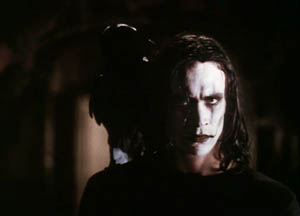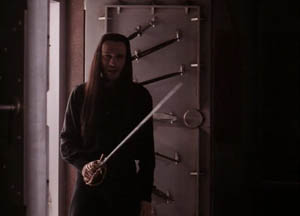|
Angst. I could stop there, but I suppose there's a few other things I should mention, so here goes: A bird's eye view tracking in on a circular window (a composition the director apparently loved so much that he all but reused it in his followup film Dark City) establishes the crime scene, wherein Eric Draven (you know, like "Raven" with an extra letter), guitar player and, uh, apparently really great guy, has been hurled to his death as his girlfriend was abused and murdered. I say "apparently" because Eric is dead before the title comes up. A little girl's voice informs us that when a death occurs amid great sorrow, sometimes a crow will carry the soul of the departed back to the land of the living to set things right. Since virtually all deaths involve great sorrow, it would seem that this bird-borne taxi service would be running nonstop and thus be common knowledge, but whatever. Eric crawls from his grave screaming and shaken on the one-year anniversary of his death, and after stopping by his apartment, where the crime scene tape remains undisturbed a year later, he heads out into the night in full-on Joker makeup in search of revenge. 
Let me just get this part out of the way now: in terms of lighting and composition, The Crow is pretty cool. Unfortunately, the pretty cool factor ends there. Despite somehow becoming a minor pop-culture touchstone, inspiring (so far) three sequels, each said to be worse than the last, there's nothing of substance here. Eric finds the various members of the gang that did him and his girlfriend in and kills them. He survives their attempts at self-defense because, being dead already, he's invulnerable. This is interesting for about five minutes, after which it becomes painfully apparent that there's not going to be any real struggle for our protagonist; indeed, they don't even bother to give Eric a weakness until the final confrontation, making any sort of dramatic tension impossible to generate. The revenge story is a pretty standard one, but the problem here is that we know nothing of this man or the woman he wishes to avenge, other than the fact that they were nice to the little girl whose narration laid out the plot for us back at the start. Well, that's not utterly true. We know Eric was in a band, and sometimes he goes up to his old rooftop to play guitar solos into the night, which I expect was meant to be "haunting" or "soulful," and not "really fucking stupid." 
The world is either the near future or some alternate world, where everyone looks like the offspring of Trent Reznor and Marilyn Manson. Bad guys and badder guys scheme to blow things up, and, when that becomes de rigueur, to blow bigger things up. The hero wears leather pants unironically and fails to notice that his sporadic heartfelt speeches are undercut by the silliness of his makeup. Ernie Hudson is reasonably pleasant to watch in an underwritten role, but mostly because he's Ernie Hudson, who just comes off as naturally genial. Otherwise, he's the cop who's on the outs with his superiors despite being much more clued-in and clever, also known as The Only Cop Character Hollywood Can Write. As a four-minute music video, the film's most obvious pedigree, The Crow would be overdone pretention. As a feature film, it's hopelessly ponderous and hits about one and a half notes for its entire length. I hate to speak ill of the late Brandon Lee, who was accidentally killed during production, but I find his character completely uncompelling. If he has a personality, it must've been featured in scenes they never got the chance to film. Sure, he tells a pretty good joke about Jesus, but Eric Draven is otherwise a Goth-ed up Superman with no real worries until his own personal Kryptonite is finally found. Batman might seem a closer comparison given the darker tone, but though Batman too is motivated by revenge, even the bad Batman films attempt to portray Bruce Wayne as having a life and a personality outside of his avenging alter-ego. Eric Draven is all smartass anger and cocksure bravado. Worse, his final play against his enemy isn't even sensical within the mythology of the film, made that much more obvious by the fact that he has to explain to the villain what he's doing as he does it, lest we be left completely clueless. So, yeah. Angst. -review by Matt Murray
|
|
||||||||